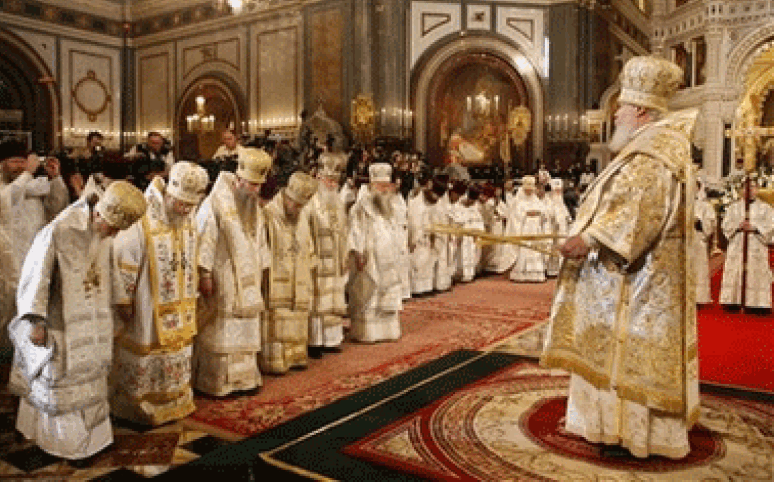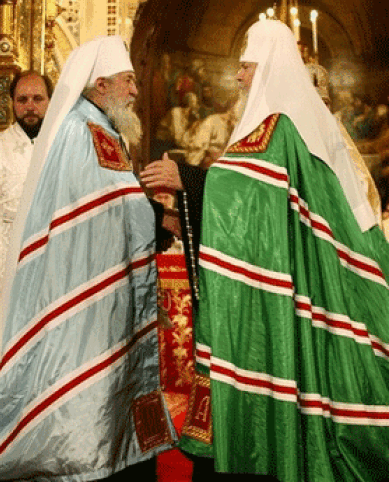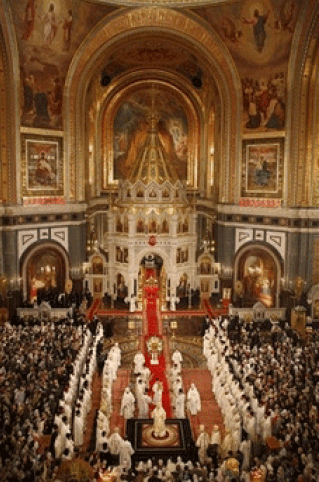MOSCOW (AP) - Russian Orthodox leaders will move to end nine decades of bitter division Thursday with a pact reuniting the main church in Russia with a breakaway church that split off as Communist rule took hold after the Bolshevik Revolution.
Patriarch Alexy II, who heads the largest flock in the Orthodox Christian world, is to sign the Canonical Communion Act with Metropolitan Laurus, the leader of the Russian Orthodox Church Outside of Russia.
The ceremony is to take place at Moscow's Christ the Savior Cathedral — a symbol of the revival of Russia's dominant church since the 1991 collapse of the officially atheist Soviet Union. The golden-domed church is a replica of the cathedral blown up in 1931 on the orders of Soviet dictator Josef Stalin.
"I think we stand today on the threshold of a historic event that will liquidate the tragic consequences of the civil war, which divided our people and divided our church," Alexy said Wednesday at a session of the Moscow Patriarchate leadership, the RIA-Novosti news agency reported.
The church abroad split from the Moscow Patriarchate three years after the 1917 revolution and cut all ties in 1927, after the leader of the Russian Orthodox Church, Patriarch Sergiy, declared the church's loyalty to the Communist government.
The Russian Orthodox Church had said that Sergiy's move was aimed at saving the church, but the breakaway group found it unpalatable. The Moscow Patriarchate disavowed the declaration last year, setting the stage for the reconciliation.
Laurus has emphasized that the reunion is not a merger, and his branch will maintain administrative control over its 400-plus parishes worldwide.
The New York-based church reports 480,000 U.S. members, while the Moscow Patriarchate says about two-thirds of Russia's 142 million people are Russian Orthodox and that it has millions of followers in other ex-Soviet republics.
Each church will maintain its own council of bishops, but their clergy will be able to lead services and their parishioners take communion in both churches.
The church abroad will have autonomous status, appointing its own hierarchy subject to confirmation in Moscow, said Andrei Zolotov, a Russian Orthodox Church expert.
Alexy stressed that the Russian Orthodox Church Outside of Russia would retain its property and financial independence, and predicted that its autonomy would not change "in the foreseeable future."
But "maybe this will change in decades," he was quoted this week by the ITAR-Tass news agency.
Talk of re-establishing ties began after the Soviet collapse in 1991, which sparked a revival of organized religion in Russia. Both churches formed working groups after a 2003 visit to Russia by three emigre archbishops and a 2004 visit by Laurus.
Alluding Wednesday to sometimes difficult talks, Alexy said "there were times when it was hard to imagine that the reunification would occur," RIA-Novosti reported.
Copyright © 2007 The Associated Press. All rights reserved. The information contained in the AP News report may not be published, broadcast, rewritten or redistributed without the prior written authority of The Associated Press.










